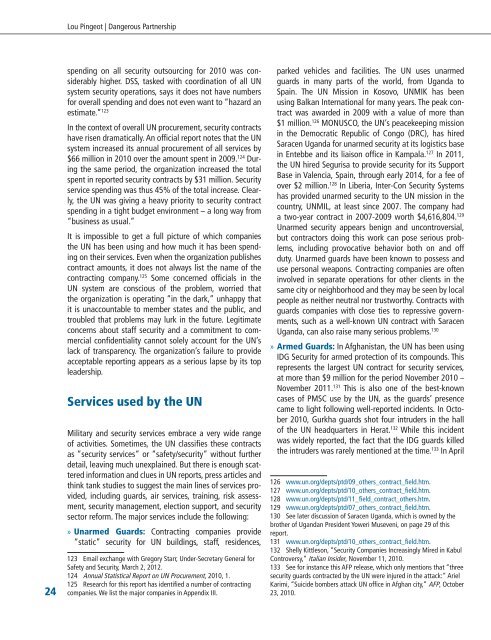Dangerous Partnership
Dangerous Partnership
Dangerous Partnership
Create successful ePaper yourself
Turn your PDF publications into a flip-book with our unique Google optimized e-Paper software.
24<br />
Lou Pingeot | <strong>Dangerous</strong> <strong>Partnership</strong><br />
spending on all security outsourcing for 2010 was considerably<br />
higher. DSS, tasked with coordination of all UN<br />
system security operations, says it does not have numbers<br />
for overall spending and does not even want to “hazard an<br />
estimate.” 123<br />
In the context of overall UN procurement, security contracts<br />
have risen dramatically. An official report notes that the UN<br />
system increased its annual procurement of all services by<br />
$66 million in 2010 over the amount spent in 2009. 124 During<br />
the same period, the organization increased the total<br />
spent in reported security contracts by $31 million. Security<br />
service spending was thus 45% of the total increase. Clearly,<br />
the UN was giving a heavy priority to security contract<br />
spending in a tight budget environment – a long way from<br />
“business as usual.”<br />
It is impossible to get a full picture of which companies<br />
the UN has been using and how much it has been spending<br />
on their services. Even when the organization publishes<br />
contract amounts, it does not always list the name of the<br />
contracting company. 125 Some concerned officials in the<br />
UN system are conscious of the problem, worried that<br />
the organization is operating “in the dark,” unhappy that<br />
it is unaccountable to member states and the public, and<br />
troubled that problems may lurk in the future. Legitimate<br />
concerns about staff security and a commitment to commercial<br />
confidentiality cannot solely account for the UN’s<br />
lack of transparency. The organization’s failure to provide<br />
acceptable reporting appears as a serious lapse by its top<br />
leadership.<br />
Services used by the UN<br />
Military and security services embrace a very wide range<br />
of activities. Sometimes, the UN classifies these contracts<br />
as “security services” or “safety/security” without further<br />
detail, leaving much unexplained. But there is enough scattered<br />
information and clues in UN reports, press articles and<br />
think tank studies to suggest the main lines of services provided,<br />
including guards, air services, training, risk assessment,<br />
security management, election support, and security<br />
sector reform. The major services include the following:<br />
» Unarmed Guards: Contracting companies provide<br />
“static” security for UN buildings, staff, residences,<br />
123 Email exchange with Gregory Starr, Under-Secretary General for<br />
Safety and Security, March 2, 2012.<br />
124 Annual Statistical Report on UN Procurement, 2010, 1.<br />
125 Research for this report has identified a number of contracting<br />
companies. We list the major companies in Appendix III.<br />
parked vehicles and facilities. The UN uses unarmed<br />
guards in many parts of the world, from Uganda to<br />
Spain. The UN Mission in Kosovo, UNMIK has been<br />
using Balkan International for many years. The peak contract<br />
was awarded in 2009 with a value of more than<br />
$1 million. 126 MONUSCO, the UN’s peacekeeping mission<br />
in the Democratic Republic of Congo (DRC), has hired<br />
Saracen Uganda for unarmed security at its logistics base<br />
in Entebbe and its liaison office in Kampala. 127 In 2011,<br />
the UN hired Segurisa to provide security for its Support<br />
Base in Valencia, Spain, through early 2014, for a fee of<br />
over $2 million. 128 In Liberia, Inter-Con Security Systems<br />
has provided unarmed security to the UN mission in the<br />
country, UNMIL, at least since 2007. The company had<br />
a two-year contract in 2007-2009 worth $4,616,804. 129<br />
Unarmed security appears benign and uncontroversial,<br />
but contractors doing this work can pose serious problems,<br />
including provocative behavior both on and off<br />
duty. Unarmed guards have been known to possess and<br />
use personal weapons. Contracting companies are often<br />
involved in separate operations for other clients in the<br />
same city or neighborhood and they may be seen by local<br />
people as neither neutral nor trustworthy. Contracts with<br />
guards companies with close ties to repressive governments,<br />
such as a well-known UN contract with Saracen<br />
Uganda, can also raise many serious problems. 130<br />
» Armed Guards: In Afghanistan, the UN has been using<br />
IDG Security for armed protection of its compounds. This<br />
represents the largest UN contract for security services,<br />
at more than $9 million for the period November 2010 –<br />
November 2011. 131 This is also one of the best-known<br />
cases of PMSC use by the UN, as the guards’ presence<br />
came to light following well-reported incidents. In October<br />
2010, Gurkha guards shot four intruders in the hall<br />
of the UN headquarters in Herat. 132 While this incident<br />
was widely reported, the fact that the IDG guards killed<br />
the intruders was rarely mentioned at the time. 133 In April<br />
126 www.un.org/depts/ptd/09_others_contract_field.htm.<br />
127 www.un.org/depts/ptd/10_others_contract_field.htm.<br />
128 www.un.org/depts/ptd/11_field_contract_others.htm.<br />
129 www.un.org/depts/ptd/07_others_contract_field.htm.<br />
130 See later discussion of Saracen Uganda, which is owned by the<br />
brother of Ugandan President Yoweri Museveni, on page 29 of this<br />
report.<br />
131 www.un.org/depts/ptd/10_others_contract_field.htm.<br />
132 Shelly Kittleson, “Security Companies Increasingly Mired in Kabul<br />
Controversy,” Italian Insider, November 11, 2010.<br />
133 See for instance this AFP release, which only mentions that “three<br />
security guards contracted by the UN were injured in the attack:” Ariel<br />
Karimi, “Suicide bombers attack UN office in Afghan city,” AFP, October<br />
23, 2010.


